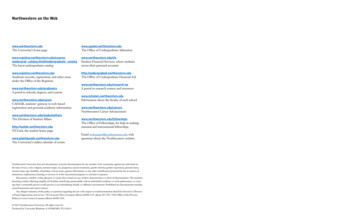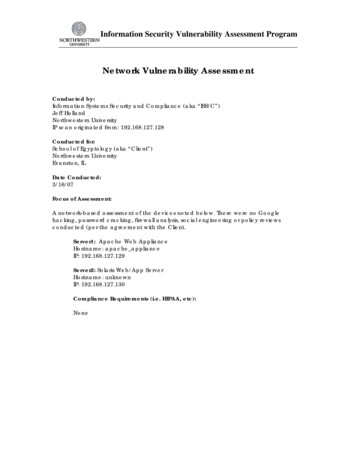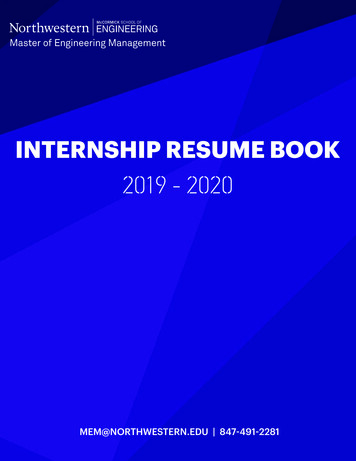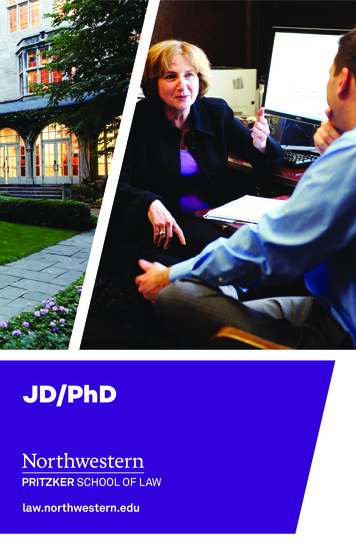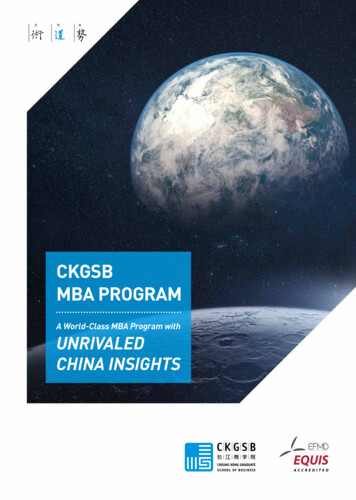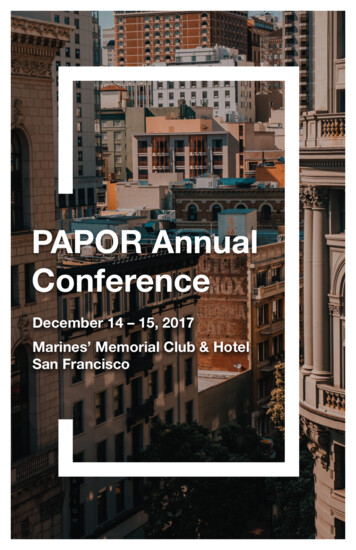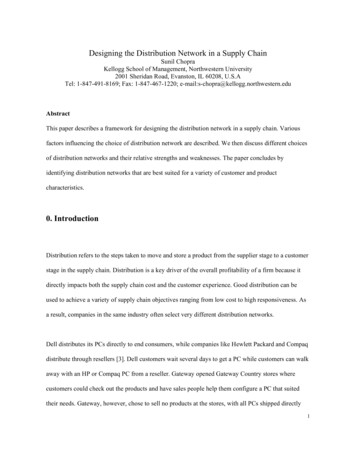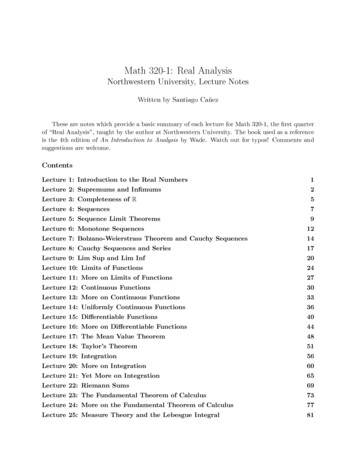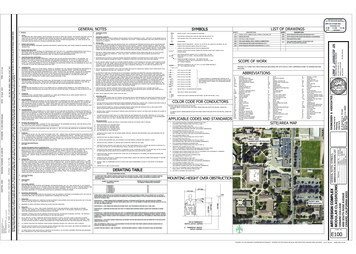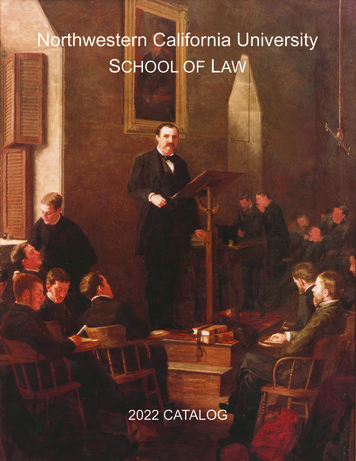
Transcription
Northwestern California UniversitySCHOOL OF LAW2022 CATALOG
Table of Contents3Message from the Dean13Course Descriptions4Staff17Bar Membership & Registration4Message from the Academic Dean18Admissions5Faculty20Transfer Students7Mission and Educational Objectives21Tuition and Finances8History of the School22School Records and Transcripts9The School Today2410What to Expect as an NWCU LawStudentEqual Opportunity and NonDiscrimination25Grades, Advancement, Standing,and Student Conduct27Frequently Asked Questions1112Accreditation and DisclosuresThe NWCU Juris Doctor Programand DegreeNorthwestern California University School of Law2021 Catalog Copyright. Northwestern California University School of Law. All rightsreserved. No part of this catalog and/or materials may be reproduced in any formor by any means without written permission.About the Cover Photo:Mary Franklin. A Class at the University of Pennsylvania Law School. 1879. Oilon Canvas. Framed, 42 x 30. Collection of the Honorable Morris S. Arnold. Usedwith Permission.Page 2
Message from the Dean“One thing more expensive than education is the lack of it.”Michael Patrick ClanceyDean of Northwestern California UniversityNorthwestern California University is a non-traditional law school. Itarose from the needs of those who desired to study law but becauseof financial limitations, family responsibilities, geographic location,time constraints, etc., could not attend a regular classroom-type lawschool.History is filled with the names of famous American lawyers andjurists who, for one reason or another, came to the Bar after havingbeen essentially self-taught in law. Persons like Abraham Lincoln,Thomas Jefferson, U.S. Supreme Court Chief Justice John Marshall,Daniel Webster, Henry Clay, (Harvard) Dean Roscoe Pound, Robert Jackson (U.S. SupremeCourt Justice and Chief U.S. Prosecutor at Nuremberg), Clarence Darrow, and many more,either spent little time in law school or, in the example of Lincoln, never even saw the inside ofa law school. They had in common a burning desire to learn law and mentors to guide them intheir quest.The information you will find in the pages that follow will give you a sense of all our law schoolhas to offer its students. Through a combination of online coursework, webcast classes,audio, video recorded lectures, and textbook study, the school provides opportunities to thoseinterested in an online Juris Doctor degree program.We at Northwestern California University commend you in your pursuit of higher knowledge.Abraham Lincoln once wrote to a young student interested in studying law, telling him:“Get the books, and read and study them till you understand them in theirprincipal features; and that is the main thing. Your own resolution to succeedis more important than any one thing.”Our school’s innovative, quality program will help you succeed. It is exceptional not because theschool has been in existence for over three decades, since 1982; but instead, the school hasbeen in existence for that period of time because the program is exceptional.I now invite you to discover some of the many aspects of what makes the online law studycommunity of Northwestern California University an extraordinary place to learn.Very Truly Yours,Michael P. ClanceyDeanPage 3
Staff MembersMichael P. Clancey,DeanMary Schofield,Academic DeanGeorge Castagnola, Jr.,Dean of InstructionLori Zapata,Executive DirectorOffice StaffMichael P. Clancey, DeanNicholas Olivares, Admissons and Records SpecialistLori Zapata, Executive DirectorJessica Reyes, Admissons and Records SpecialistMary Schofield, Academic DeanCrystal Baza, Admissons and Records SpecialistOscar Olivares, IT DirectorRita Cole, Admissons and Records SpecialistMessage from the Academic DeanI am so glad you are considering the law study program offered by Northwestern California UniversitySchool of Law. We are proud of the uniqueness of our school’s flexible program that offers a quality legaleducation for applicants seeking California State Bar eligibility. It is equally suitable for students with othercareer goals in mind.As a graduate of NWCU myself, I can attest to the fact that, although the program is rigorous, it makes thegoal of becoming an attorney achievable. I have enjoyed practicing law in California and would not havebeen able to become an attorney without NWCU’s program.We are eager to help you get started and to work with you toward success. After reading the information inthis catalog, we hope you will be as excited about our program as we are. We invite you to call or email toask any questions you may have about the program.We look forward to receiving your application for enrollment.Sincerely,Mary SchofieldAcademic DeanPage 4
FacultyGeorge Castagnola, Jr., Professor of Law/Dean of InstructionJ.D. Northwestern California UniversityB.S.L. Northwestern California UniversityB.A. St. Mary’s CollegeMember of the Bar, State of CaliforniaMichael P. Clancey, Professor of Law/DeanJ.D. Western State UniversityLL.M. Regent University School of LawLL.M. Thomas Jefferson School of LawB.S.L. Western State UniversityDegree of the Utter Bar - Middle Temple,EnglandStudied Law in England at the University ofLeicester with U.S. to U.K. Law Revision atthe University of OxfordQualified in England & Wales as a Solicitor,Solicitor-Advocate, and BarristerFormer United States Marine Corps JudgeAdvocateMember of the Bar, State of CaliforniaMember of the Bar of England & Wales(Barrister)Member of Middle Temple Inn of Court,London, EnglandMichael L. Bishop, Professor of LawJ.D. Northwestern California UniversityM.S. Pacific Lutheran UniversityB.S.L. Northwestern California UniversityB.S. University of WashingtonFormer Assistant Professor - United StatesAir Force AcademyMember of the Bar – CaliforniaKate Shaw Chang, Professor of LawJ.D. University of Arizona, James E. RogersCollege of LawB.A. University of California, San DiegoMember of the Bar - Arizona Public PolicyAdvocateMargaret Doyle, Professor of LawJ.D. University of Northern CaliforniaMember of the Bar, State of CaliforniaJames A. Filippi, Professor of LawJ.D. Northwestern California UniversityB.S.L. Northwestern California UniversityB.S.B.A. California Coast UniversityA.S. Diablo Valley CollegeFormer Police Officer - Richmond, CaliforniaMember of the Bar – CaliforniaJeff A. Fleming, Professor of LawJ.D. Western State UniversityB.A. University of the PacificMember of the Bar, State of CaliforniaOwner / Instructor, Fleming’s Fundamentalsof LawMichael R. Gadue, Professor of LawJ.D. Albany Law SchoolLL.M. University of Leicester, EnglandM.S.A. St. Michael’s CollegeM.A. Salve Regina UniversityB.A University of VermontServed as an Assistant Attorney General forthe State of VermontFormer United States Army Judge AdvocateFormer Member of the Bar, State of VermontTerry L. Gilbeau, Professor of LawJ.D. Northwestern California UniversityLL.M. Thomas Jefferson School of LawB.S.L. Northwestern California UniversityMember of the Bar, State of CaliforniaHolly B. Hatfield, Professor of LawJ.D. Lewis and Clark Law SchoolB.A. Claremont McKenna CollegeFormer United States Army Judge AdvocateFormer Member of the Bar - State of WashingtonMember of the Bar – WyomingNeil Ison, Professor of LawJ.D. Santa Clara University School of LawB.A. University of MichiganFormer Member of the Bar - State of CaliforniaPage 5
Suzette C. Jacobsen, Professor of LawB.S. Brigham Young UniversityB.S.L. Northwestern California UniversitySchool of LawJ.D. Northwestern California UniversitySchool of LawMember of the Bar: CaliforniaJ.D. Northwestern California UniversitySchool of LawLL.M. in International Law & Taxation - SaintThomas University College of LawLL.M. in International Taxation and FinancialServices - Thomas Jefferson School of LawMember of the Bar: California, Massachusetts, Florida, Washington D.C. and PuertoRico (Federal)April M. Molin, Professor of LawJ.D. Whittier Law SchoolB.A. California State University, NorthridgeMember of the Bar, State of CaliforniaInstructor, Fleming’s Fundamentals of LawPatricia Morrow, Professor of LawLL.B. (Hons) London School of Economicsand Political Science (LSE), University ofLondonPostgraduate Diploma in Legal Practice Guildhall School of Business and Law atLondon Metropolitan UniversityAdmitted to the Roll of Solicitors of the SeniorCourts of England & Wales (Solicitor)Member of the Bar: WisconsinJerome L. Munford, Professor of LawB.A. Lincoln UniversityJ.D. Temple UniversityAdministrative Law Judge for the SocialSecurity Administration’s Office of HearingsOperationsMember of the Bar: PennsylvaniaMary Schofield, Professor of Law/AcademicDeanJ.D. Northwestern California UniversitySchool of LawB.S.L. Northwestern California UniversityA.A. Glendale Community CollegeMember of the Bar, State of CaliforniaAdmitted to the Roll of Solicitors of the SeniorCourts of EnglandAaron S. Tenzer, Professor of LawJ.D. Chapman University School of LawB.A. Chapman UniversityMember of the Bar, State of CaliforniaInstructor, Fleming’s Fundamentals of LawMatthew C. Tymann, Professor of LawB.A. Georgetown UniversityJ.D. Cornell UniversityMember of the Bar: California, Massachusetts, and New YorkDaniel G. O’Donnell, Professor of LawJ.D. University of the Pacific, McGeorgeSchool of LawA.B. University of California, DavisMember of the Bar, State of CaliforniaTara E. Ozes, Professor of LawJ.D. Indiana University, Bloomington, MaurerSchool of LawA.B. University of California, DavisMember of the Bar, State of CaliforniaLorenzo J. Palomares, Professor of LawB.B.A. Western States UniversityM.B.A. Western States UniversityPage 6
Mission and Educational ObjectivesMissionThe mission of Northwestern CaliforniaUniversity is to provide affordable, qualityeducation in law to individuals around the worldthrough non-resident study.The main goal of the school is to teach studentswho cannot attend law school in a traditionalsetting because of economic obstacles, familycommitments, remoteness of location, andother hardships.Educational Objectives and GoalsTo accomplish its mission, the school has thefollowing objectives:1. To educate students for a career in law.2. To equip those students withknowledge of law, skills and ethicalvalues, while teaching them the basicreasoning underlying laws in the UnitedStates.3. To promote critical evaluation of lawand its application to situations in abroad perspective.The school operates to achieve its statedacademic mission, objectives and goals byoffering a distance learning program usingan internet-based course managementsystem which is designed to combine the bestfeatures of traditional law schools with moderntechnology. The program includes traditionalcasebooks, virtual classrooms, recordedaudio and video lectures, real-time interactionbetween faculty and students, student studygroups, online discussion boards, and muchmore.Page 7
History of the SchoolNorthwestern California University Schoolof Law was founded in 1982. It is the oldestlaw school of its type in California, havingbeen approved in 1982 by the CaliforniaDepartment of Education to issue degrees.The NWCU Juris Doctor (J.D.) degreeprogram is presently accredited by theCommittee of Bar Examiners of the State Barof California, as described on page 11 of thiscatalog.Northwestern California University has fromits inception focused on providing a lawstudy program of the highest quality at a veryaffordable rate of tuition to people who livefar from traditional schools, or with familycommitments, or jobs that involve irregularhours, or travel.“I attribute the success of theschool and its graduates to thehard work and pursuit of educational excellence of the staff, faculty and alumni of our school,and; I am confident our currentstudents will succeed as well.”Michael Patrick Clancey, DeanGraduates of the school’s Juris Doctor lawstudy program include many who havegone on to occupy influential positions ingovernment. They have been employed inpositions such as the following:Students, both past and present, includegraduates of leading colleges anduniversities throughout the world includingOxford, Harvard, Yale, Stanford, MIT,Beijing University, the University of Paris,Keio University of Japan, the University ofMichigan, the U.S. Naval Academy, the U.S.Air Force Academy, and many others. Deputy District Attorney Public Defender Deputy Public Defender Deputy County Counsel City Attorney Administrative Law Judge General Attorney at the U.S. EqualEmployment Opportunity Commission,Office of Federal Operations inWashington D.C. Court Executive for a U.S. DistrictCourt Director of the Office of Thrift Supervision, U.S. Department of Treasuryin Washington D.C. (Presidentialappointee)Many others, after graduation, have beenpromoted to high-level positions in businessand industry, and still others have enteredthe private practice of law, fulfilling lifelongambitions.Page 8
The School TodayThe school is located in a modern officebuilding with a beautiful riverside setting nextto the Sacramento River in Sacramento,California. The school’s facility contains anadministrative lobby, faculty offices, a mootcourtroom and a law library.The school’s program is offered onlinethrough its own eJuris course managementsystem and technology platform. Ejuris features online discussion boards, audioand video lectures, virtual classrooms, andmore, to provide dynamic collaboration andcommunication between students and facultymembers. Students also have access toan electronic law library through a studentsubscription to LexisNexis.The faculty consists of law professors whoare available to students via the school’sonline discussion boards, videoconferencing,and email.The school’s students are amazingly diverse.Because the school’s program involvesindependent and online study, students joinfrom all over the world. Additionally, althoughsome students enroll straight after completinga first college degree, many of the school’sstudents are seeking a second professionafter years of success and distinction inanother career field.Many applicants qualify for admissionwithout a prior college degree, based on theirhaving acquired sufficient course credits (60semester college units) or adequate scoreson College Level Equivalency Program(CLEP) tests. See the Admissions section formore information.Page 9
What to Expect as an NWCU Law StudentAs a distance program, “classes” have adifferent connotation at NWCU than what youmay be used to from experiences at otherschools in the past. In a traditional school,students are typically assigned to a class, andprofessors instruct the students by teachingthe course material and giving assignments.There may be a course syllabus, but studentsoften don’t need to look at it much, if at all. Ina traditional law school, the class is the mainfeature of the educational program, and aprofessor dominates by deciding the order inwhich key concepts are covered, how thoseconcepts will be presented, what assignmentsor learning activities will be most useful tostudents, and by ultimately assigning a gradewhich signifies how well the student haslearned the material.At NWCU, the program is much moreadministratively governed and dependent onstudent initiative and self-direction. Coursematerials, assignments, and requirementsare set for the entire program by the school’sadministrators, who have worked with thefaculty to select materials, assignments, andrequirements for every course. Becauseof this, students will find continuity anduniformity not found in typical class-basedprograms. At NWCU, students must read theassigned texts, complete assignments, andtake exams in a similar way for nearly everycourse. Each course has a detailed coursesyllabus which sets forth all the requirementsstudents must meet to pass the course. Thesyllabus includes a suggested study plan tohelp students coordinate and pace their work,but students have a great deal of flexibility totailor their studies to fit their learning stylesand schedules.For those who learn well in a class setting,NWCU offers many classes, but studentsselect which classes they want to attend. Allprofessors cover key topics for the courseand focus on teaching legal concepts,important cases, foundational laws, and howthese apply to various factual scenarios. Eachclass is recorded and available to watch laterfor those who either can’t attend live, or wholearn better by selecting specific classesbased on the concepts they want to study at aparticular time. In addition to classes, NWCUoffers a variety of other kinds of learningactivities to help students learn the law. Forexample, there are computerized lessonssuch as those from CALI (The Center forComputer-Assisted Legal Instruction), videolectures, audio recordings of key terminology(Clancey’s Outlaws), discussion boards, andmore.Reading of required course materials is justthat — required. The selected course textspresent the core concepts for the course ina systematic approach that allows studentsto build comprehensive knowledge of thefoundational substantive law. Assignmentsand exams are submitted to the administrativeoffice and graded by NWCU professors,who collaborate with each other to ensurea calibrated grading system. The gradingsystem is uniform across all courses andpresented in the Student Handbook.Page 10
Accreditation and DisclosuresNorthwestern California University School ofLaw is fully accredited by the Committee ofBar Examiners of the State Bar of California.Disclosure required by the State Bar of California to beprovided by all Accredited Law Schools in California:Study at, or graduation from, thislaw school may not qualify a studentto take the bar examination or beadmitted to practice law in jurisdictionsother than California. A studentwho intends to seek admission topractice law outside of Californiashould contact the admitting authorityin that jurisdiction for informationregarding its education and admissionrequirements.Complaints regarding the School’s JurisDoctor Degree Program can be directed tothe Committee of Bar Examiners as follows:Committee of Bar ExaminersThe State Bar of California180 Howard StreetSan Francisco, CA on of RightsNorthwestern California University reservesthe right to refuse admission to any applicantand to disqualify, discontinue or exclude anystudent.The university also reserves the right tochange its policies, including but not limited totuition, fees, unit or hourly value per course,course offerings, curricula, grading policies,graduation and degree requirements, andadmission standards and policies.Page 11
The NWCU Juris Doctor Program and DegreeThe Juris Doctor (J.D.) degree is a graduate,professional doctorate degree that isconferred upon those who complete theschool’s J.D. program. The NWCU J.D.program requires completion of four academicterms of study with a cumulative grade pointaverage of at least 2.0.Completion of the NWCU J.D. degreequalifies a student to take the California BarExamination.NWCU’s J.D. ProgramStudents use eJurisTM, the school’s dynamicinternet-based course management systemand technology platform, to access onlinecourse material, and to collaborate andcommunicate online with fellow students andfaculty members. Additionally, students studypurchased casebooks and other requiredmaterials for each course. An online syllabusfor each course helps with planning andpacing the reading and studies.Online, real-time classes are available in theschool’s virtual classroom, and students whocannot attend live can watch recorded classeswhen it is convenient for them. All studentshave access to an electronic law library.Faculty members are available to answerquestions, and the school’s administrativestaff is available to assist as needed.Online audio/video lectures and recordedterminology are available to students.Course requirements include readingassigned casebooks and texts, completingassignments, and taking quizzes, midtermsand final examinations. A course syllabus isprovided for each course, with details abouteach requirement for the course.Time Requirement for StudiesThe School’s Law Study Bar Program isregulated by the State Bar of California. Itrequires that each term must be completedin 12 months. A typical term will includecourses totaling 20 credits and will require aminimum of 300 hours of verified academicengagement and 600 hours of further studyand preparation. Over the course of fourterms, students must complete a minimum of1200 hours of verified academic engagementand 2400 hours of further study andpreparation.Student ServicesNorthwestern California University offersacademic counseling as needed. It also offersassistance to advanced students seekingcertification to participate in the State Bar ofCalifornia’s Practical Training of Law Students(PTLS) program that may allow them toprovide legal services under the supervisionof an attorney.Northwestern California University does notprovide job placement services.LexisNexis & Library Letter ofIntroductionLexisNexis online law library privileges areprovided to all of the school’s students.Access to and use of a law library in aphysical facility is not required. However, aletter of introduction is provided to enrolledstudents to assist them in obtaining useprivileges at law libraries. Students areadvised to present the letter to librarians atlaw libraries or law offices in their local areas.Page 12
Course DescriptionsPART I — First TermIntroduction to Law, Legal Analysis,and Legal Research(4 units)Introduction to the basic concepts of law andlegal analysis, and the history of the Americansystem of jurisprudence and juristic theorythat originated from, and was developedand formulated through, the common lawof England, and is now recognized as anorganic part of the jurisprudence of most ofthe United States.he major categories of torts: intentional,negligent, and strict liability. Tort injuries arecovered from causation through remedy forcases involving injuries to person, includingphysical and emotional harm and harm toreputation, and injuries to property, includingboth real and personal property. Discussionis included for specific topics such asdefamation of character, invasion of privacy,misrepresentation, products liability, andmodern torts such as wrongful death.PART II — Second TermContractsBusiness AssociationsA study of the promissory agreements thatexist between two or more persons or entitiesand that create, modify, or terminate legalrelationships. The different classifications ofsuch agreements and the requisite elementsof each will be distinguished.A study of the various structures forbusinesses. Agency law is covered, includingcreation of agency relationships and theauthority and fiduciary duties of both agentand principal. Partnerships, from creationthrough winding up, and the rights, duties,and liabilities of partners are also covered.Finally, formation and types of corporationsare covered, as well as the rights and dutiesof directors, shareholders and corporateofficers. Attention is given to court made legalprinciples and to the rapidly expanding impactof federal regulation of corporations andsecurities.(6 units)(6 units)Criminal Law(4 units)A study of key aspects of criminal lawincluding how the criminal process works;common law origins of criminal law andstatutory modifications; an introductoryoverview of basic criminal procedure toenable understanding of criminal law; thefundamental bases of substantive criminallaw, including definitions of criminal conduct,principles and scope of criminal liability anddefenses to liability; classification of crimes;and elements of major crimes.Torts(6 units)An analysis of the historical developmentand purposes of tort law, and analysis ofCriminal Procedure(4 units)A course that covers the legal methods forapprehending persons accused of committingcriminal acts. The rights of those accusedof crimes are covered, along with methodsof protecting those rights and remediesfor violations. The criminal process fromcommission of a crime and apprehensionthrough the various phases of adjudicationare also covered.Page 13
Real Property(6 units)A study of the body of law relating to landand improvements thereon; as distinguishedfrom movable personal property. The EnglishCommon Law as it relates to real property willbe emphasized.Remedies(4 units)A study of the remedies available for tort andcontract matters, including both legal andequitable remedies. Specific legal remediesfor various injuries and contract breachesand computation of damages is included.Additionally, analysis of equitable remedieswill equip the student to understand thephases and requirements for the imposition ofinjunctions.PART III — Third TermCivil Procedure(6 units)A survey of the civil process that covers eachstep from initial complaint through appeals.Personal and subject matter jurisdiction arethoroughly covered, and venue and transferrules are presented. The Erie Doctrine, itsdevelopment, and its applicability in moderncivil actions is covered. Also addressed arethe handling of multiple claims and parties,including class actions. Finally, proceduraltrial issues such as discovery methods, trialprocess, appellate review and its limitations,and the effects of the doctrines of res judicataand collateral estoppel are covered.Constitutional Law(6 units)A study of a wide range of topics drawn fromthe United States Constitution, beginningwith the powers of the various branches ofgovernment and the concept of separationof powers. Authority to hear cases, includingthe Case and Controversy Doctrine arepresented, as is the division of powersbetween the federal government and thestates. The power of the government toregulate economic and personal interests isthoroughly covered, including the levels ofprotection from interference with personalinterests, equal protection, and due process.Finally, due process and procedure, theconcept of state action, and the FirstAmendment rights of freedom of speech andreligion are thoroughly covered.Evidence(4 units)A study of the importance of getting evidenceadmitted and on the trial record, and theprocess by which this is accomplished. First,the requirements related to relevance areintroduced, then the reasons why relevantevidence may be excluded, including athorough presentation of the hearsayrules and exceptions. Special evidentiaryrules such as confidentiality of certaincommunications and privileges are explained.Both testamentary and documentaryevidence are covered, including admissibilityrequirements for both.Professional Responsibility (Ethics)(4 units)A study of the role and duties of a lawyer,including the duty to the court, to the client,and to society. Regulation of attorneys’conduct and disciplinary action are covered,including the varying requirements ofthe Model Rules and Model Code. Bothaspirational goals of conduct and disciplinaryrules are presented. The rules and practicalapplication of the duty of confidentiality,potential and actual conflicts of interest,advertising and solicitation, and other keyaspects of ethical obligations will be covered.Additionally, judicial ethics will be addressed.Page 14
PART IV — Fourth Termcovered, including gifts during life as well asupon death. Wills, intestate succession, andtrusts are the primary focus.Administrative Law(5 units)A study of the history and creation ofadministrative agencies, generally vialegislative action. Control of administrativeagencies is considered, with attention tothe competing interests and powers of theexecutive and legislative governmentalbranches, as well as to the monitoring anddirection by the judicial branch. Formal andinformal administrative actions are studied,focusing on rulemaking and administrativeadjudication. Finally, investigation anddiscovery of administrative agency action andchallenges to such actions are covered.Community Property(3 units)An overview of the ways ownership ofproperty by married persons is classified,followed by consideration of how the variousclassifications affect the disposition ofproperty both upon dissolution and death.Presumptions related to classification ofproperty are covered, as are exceptionsto those presumptions. Finally, selectedprovisions of the California codes related tocommunity property are reviewed.Practical Skills Elective(6 units)Fourth year students take one of the followingfour elective courses: Legal DocumentDrafting, Legal Practice, Professional Skills,or Trial and Appellate Advocacy.ELECTIVE COURSESElective courses are for third and fourth yearstudents, and for transfer students who havealready completed all or most of the NWCUstandard curriculum but need additionalcourses to meet graduation requirements.Advanced Legal Research(6 units)This course focuses on learning andpracticing advanced legal research methodsfor scholarly legal writing, through the use ofprimary and secondary resources availableonline or through physical law libraries.Students write a law journal style paper on atopic of interest to them, using the researchskills they have developed.Legal Document Drafting(6 units)The course exposes students to basic legaldocument drafting in three key modes:litigating, informing and persuading, and rulemaking. Drafting a broad range of documents,students will learn techniques applicableto the most common legal documents.Students will draft a complaint, motion, trialbrief, statute revision, contract, and more.Additionally, students will consider the effecttheir writing style has upon the documentsthey draft, and they will learn how legal writinghas affected case law.Wills, Trusts & Estates(6 units)This course is a study of the laws related tosuccession of property upon death of theowner. Various means of passing property tothose designated by the property owner arePage 15
Legal Practice InternshipPhilosophy of LawThe primary focus of the cou
LL.M. Regent University School of Law LL.M. Thomas Jefferson School of Law B.S.L. Western State University Degree of the Utter Bar - Middle Temple, England Studied Law in England at the University of Leicester with U.S. to U.K. Law Revision at the University of Oxford Qualified in England & Wales as a Solicitor, Solicitor-Advocate, and Barrister
